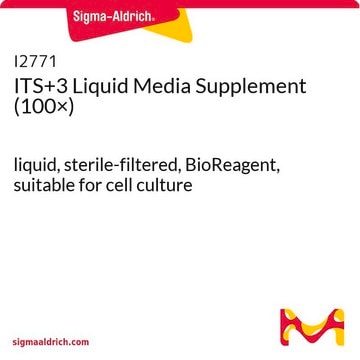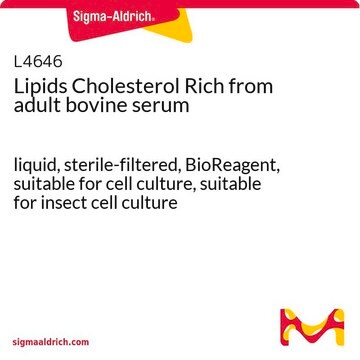L9655
Linoleic Acid-Oleic Acid-Albumin, 100x
liquid, sterile-filtered, BioReagent, suitable for cell culture
Synonym(s):
Fatty Acid-Albumin-complexes
About This Item
Recommended Products
biological source
protein from bovine
sterility
sterile-filtered
product line
BioReagent
form
liquid
composition
linoleic acid and oleic acid, 2 mol/mol albumin (each)
concentration
100 mg/mL BSA in DPBS
technique(s)
cell culture | mammalian: suitable
impurities
endotoxin, tested
storage temp.
2-8°C
General description
Application
- to induce acute hepatocellular stress in primary hepatocytes
- to induce oxidative stress in cytotrophoblasts
- to induce lipid droplet accumulation in HepG2 cells
related product
Storage Class Code
10 - Combustible liquids
WGK
WGK 3
Flash Point(F)
Not applicable
Flash Point(C)
Not applicable
Personal Protective Equipment
Certificates of Analysis (COA)
Search for Certificates of Analysis (COA) by entering the products Lot/Batch Number. Lot and Batch Numbers can be found on a product’s label following the words ‘Lot’ or ‘Batch’.
Already Own This Product?
Find documentation for the products that you have recently purchased in the Document Library.
Customers Also Viewed
Articles
Importance and uses of linoleic acid in serum-free eukaryotic, including hybridoma and Chinese Hamster Ovary (CHO) cell, cultures
How the unsaturated fatty acid, oleic acid and other cell culture components affect the performance of serum-free, protein-free cell culture systems used for biomanufacturing heterologous proteins including monoclonal antibodies.
Our team of scientists has experience in all areas of research including Life Science, Material Science, Chemical Synthesis, Chromatography, Analytical and many others.
Contact Technical Service








